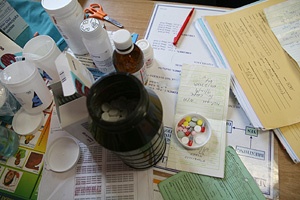The TB activist agenda
TB activists have a lot on their plates - whether it’s affordable access to the latest tuberculosis (TB) diagnostics, or pushing for more paediatric formulations. IRIN/PlusNews takes a look at the top three issues.
1. Vaccines
Two vaccines have entered the second half of Phase II clinical
trials in the past year. This is when the vaccine is given to a
larger group of people to see if it is effective at a prescribed
dose, and to further evaluate its safety.
Activists are pushing for an alternative to the only TB vaccine
available today - Bacille Calmette-Guerin (BCG) - which has been
in use for nearly 90 years. BCG has become a standard part of
national immunization programmes in many countries, but the
immunity it offers wanes after childhood.
A new TB vaccine would have to offer lasting immunity, be
heat-stable and easy to administer. It should also protect
against pulmonary TB as well as TB in other
organs.
2. Diagnostics
A two-hour
TB test
- GeneXpert - which can also detect drug-resistant TB,
drastically cut the time patients had to wait for results when
it was released in 2010. Some countries with a high TB burden,
like South Africa, have implemented wide use of the coffee-maker
sized machine that uses cartridges to perform the test. Others,
like Kenya, have been slower off the mark.
By March 2012, South Africa accounted for about half of the more
than 863,000 cartridges procured globally, according to data
presented at the South African TB Conference by Colleen Daniels,
the Treatment Action Group's TB/HIV project director.
Although the World Health Organization ranks
Kenya
as having a higher TB burden than South Africa, Kenya had only
procured about 34,000 of the cartridges by that time, Daniels
told IRIN/PlusNews.
To help countries like Kenya expand their use of GeneXpert, the
international health financing mechanism, UNITAID,
announced
on 13 June 2012 that together with the US government and the
Bill and Melinda Gates Foundation, it had reached an agreement
with the GeneXpert manufacturer, Cepheid, allowing some
high-burden countries like Kenya, South Africa and Zimbabwe to
purchase cartridges at a reduced price of US$10.
Erica Lessem, the assistant director of Treatment Action Group's
TB/HIV project, said new diagnostics that are fast, effective
and affordable are still needed. "GeneXpert is certainly no
panacea," she told IRIN/PlusNews. "We need to continue putting
pressure on diagnostic makers for point-of-care tests that can
be used in peripheral health clinics."
Countries like South Africa have rolled out the GeneXpert
machine to help boost capacity in existing TB laboratories, but
new tests would ideally move away from examining sputum samples
for TB and towards substances that are easier to collect, such
as urine, Lessem said. Patients living with HIV and children
often find sputum, or mucus coughed up from the lower airways,
difficult to produce.
3. New, better, shorter courses of drugs and compassionate
use
Two drugs that could treat multidrug-resistant (MDR-TB) and
extensively drug-resistant TB (XDR-TB) -
Delamanid
and Bedaquiline - have entered late-stage clinical trials.
Delamanid, manufactured by the Otsuka Pharmaceutical Group,
recently filed for approval of the medication by the European
Medicines Agency (EMA). This is the first new TB drug to apply
for regulatory approval in more than 40 years, Lessem told the
South African TB Conference, noting that it was particularly
promising because there would be no pre-existing resistance to
it.
Lessem says TB activists are fighting to expand pre-approval use
- or "compassionate use" - of these drugs for patients with drug-resistant TB who may
have run out of options. The compassionate use concept allows
patients earlier access to promising new drug candidates still
in clinical trials when the normally available treatment options
have failed.
Compassionate use of Bedaquiline - the other drug that could
help patients with drug-resistant TB - was sought earlier this
year from South Africa's drug regulator, the Medicines Control
Council (MCC), by civil society groups such as South Africa's
Treatment Action Campaign (TAC) and the HIV Clinicians Society
of Southern Africa.
In an open letter
to the MCC, the activists noted that Bedaquiline's potential for
improving cure rates and shortening treatment time "far
outweighs any safety concerns, especially as evidence indicates
that Bedaquiline's safety profile is far superior to that of
many existing second-line treatment options." Tibotec, the
pharmaceutical company that developed Bedaquiline, made the drug
available, free of charge, under compassionate use criteria in
mid-2011.
The Medicines Control Council
rejected
the request, saying that while the evidence of patient need was
compelling, there was insufficient data on the drug and the move
was premature.
Activists are also pushing for drug-resistant TB treatment to be
shorter, with fewer pills, less side effects and greater
compatibility with HIV treatment. According to Lessem, some
forms of treatment for drug-resistant TB are not recommended for
use with antiretrovirals.
Finally, with almost all medicines to treat drug-resistant TB
designed for adults, paediatric formulations that are easier to
administer are urgently needed. This would include scoring pills
so that they can be easily broken up into smaller,
child-friendly doses, and making them available in granular form
for mixing into food. Lessem said there needs to be a stronger
push for paediatric clinical trials, which are often not only
neglected, but hard to navigate through regulatory bodies.
PlusNews
http://www.plusnews.org/Report/95650/HEALTH-The-TB-activist-agenda


